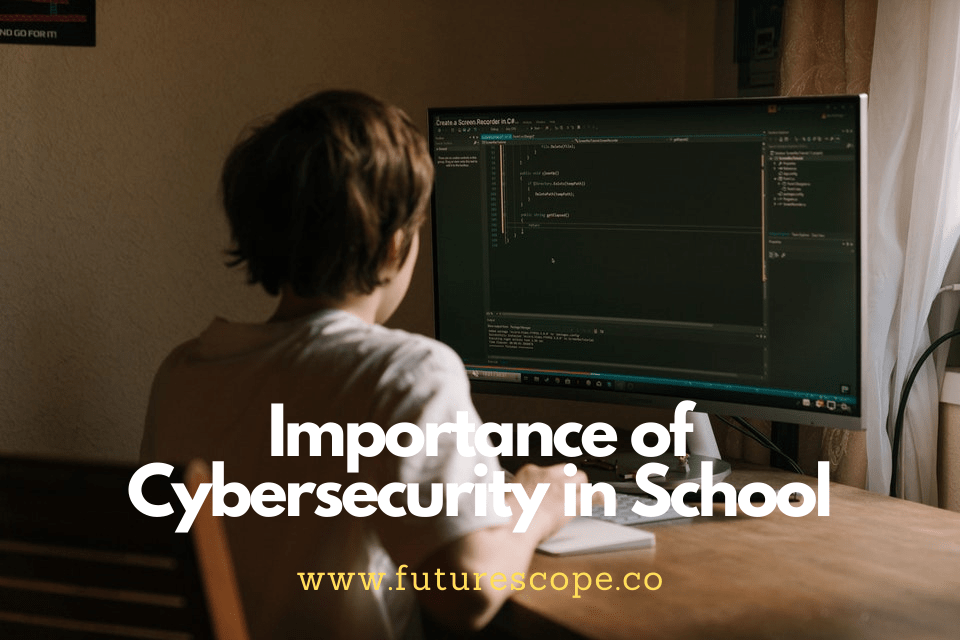What We Have Covered in This Article
Last Updated on December 4, 2021 by Editor Futurescope
The next in a series of articles by a local teacher about student safety in the classroom is coming out in a few weeks. The author feels that the discussion of personal space in the classroom has been given too much attention, and that giving students a feeling of personal safety can be more challenging when they are in their social circles after school. In the article, he presents a list of ways for parents to help their children feel safer when they are being bullied.
A huge amount of students these days have digital devices, which means cybersecurity is a top priority. There are many ways that cyberattacks on schools can be prevented, from having firewalls to reducing the number of digital devices in schools. However, there is more to cybersecurity than just digitally; it’s also about physical protection for electronic equipment and servers. This is especially important because, with so much sensitive data stored electronically, having access to schools’ databases would be a huge advantage to hackers or thieves who.
Online and offline world has completely merged over the last few years. As educators, it is important that we support our learners by implementing suitable security measures as well as technologies such as Microsoft Office 365 for safe collaboration on your documents, or secure cloud-based learning tools for ‘anytime, anywhere’ learning. Google Docs left unprotected leave information vulnerable to attacks from cybercriminals. The following is an outline of cybersecurity measures you should consider in education environments.
What is Cybersecurity?
Cybersecurity is the protection of computer systems from cyberattacks. Cybersecurity is the prevention of hacking, theft, destruction, and other malicious misuse of digital data that could be potentially harmful to an organization or individual. For instance, malware can be used to steal passwords or other sensitive information from a computer. Hackers often target large companies in an attempt to steal valuable data, such as credit card numbers.
Cybercriminals are the most common and dangerous cyberthreats. The U.S. Department of Homeland Security (DHS) estimates that each year, cybercriminals steal more than $100 billion worth of private data. Cyber criminals often attack the most vulnerable systems, such as medical devices, vehicles, and utilities. They often use sophisticated malware to hack into a computer system and steal information. Cybercrime can have far-reaching impacts. For example, healthcare organizations lose billions of dollars each year due to data breaches and cybersecurity failures. The growing number of cyber threats makes it difficult for organizations to defend against these cyberattacks. Most institutions use traditional anti-virus software to prevent cyberattacks. This solution is not effective enough, as cybercriminals continue to develop new malware that bypasses traditional anti-virus software. Additionally, traditional anti-virus software does not protect the system from data loss or ensure the safety of critical information.
How big of a problem is Cybersecurity?
Technology has become the backbone of society. We communicate with friends, study, and work with it. The problem is that these devices are not secure. Cybersecurity is a major issue for many people across the world, as they store their private information on devices that are not secure. Information can be stolen, manipulated, or altered by a third party. For example, social media accounts can be hacked if it uses the same password as a banking account. Data leaks can affect millions of people if a major retailer such as Target experienced an attack. With cybersecurity being such a prevalent problem, many government organizations are failing to protect their information from unauthorized access.
What is cyber security education?
Cyber security education is the process of learning how to protect oneself against cyber-attacks. Cyber security education is the process of learning how to protect oneself against cyber-attacks. It can involve training that teaches people to detect phishing emails, create strong passwords, and not reuse passwords across websites. There are many different types of cyber security education. There are also various methods that can be used to learn these skills. You can learn how to protect yourself from cyber-attacks using a classroom setting, such as computer labs and information security conferences.
Computer labs are excellent places to learn how to secure your own personal computer and any devices that you use on a daily basis. Information security conferences can be a great way to learn from people who have been in the field for a long time. There are a variety of different ways to learn cyber security. The most important thing is to make sure that you do not fall for phishing emails or any other online scams. If you have ever been duped by a phishing email, I hope that this guide has taught you how to avoid it in the future. So use the tips from this guide to help you on your cyber security journey.
How does cyber security relate to students?
Students who use the internet for school, work, and entertainment may not be fully aware of the danger that exists online. Cyber security is vital to protect their identity, digital assets, and other aspects of their lives from being compromised. Students should be educated on the risks of this type of technology, along with possible solutions to prevent these issues from happening. Cyber security relates to students because it’s important to have them educated on the risks of this type of technology and possible solutions in order to prevent them from compromising their identity, assets, and other aspects of their lives.
Be a digital guru!
If you want to stay safe when using the internet and don’t know how to, then I suggest that you get some training on how to keep your identity protected and what risks can occur to your identity and the information you are sending online. There are lots of training companies out there that provide various levels of training and different services.
Why is cybersecurity important for schools?
Cybersecurity is an ongoing concern for schools, with students constantly learning new ways to exploit gaps in security systems. Schools need to make sure their cyber defenses are constantly updated and improved to keep up with the latest threats. This prevents hacking or other digital attacks that may take down the school’s network, making it unavailable for students to complete their coursework. Why is cybersecurity important for schools?
Why, without cybersecurity, how could we prevent cruel and deceptive acts from changing our children’s perspectives on life? How could we make sure that they were only exposed to good things online and never exposed to things that might be harmful? How would we protect them from cyberbullying or other hurtful words and actions?
It is estimated that 2/3 of the cyberattacks worldwide come from outside the United States. Children are at the highest risk of being targeted by cyber attacks and cyberbullying. As students grow older, they begin to explore the world outside of school more in-depth than before. This means that they also grow in the skills necessary to learn how to build relationships, interact with others, and share their ideas on the Internet. However, with that comes the possibility for harm and abuse. The most recent information shows that, annually, 1/3 of 10th graders have been bullied online, and more than a quarter have experienced cyberbullying on social media websites. Is technology the answer?
All schools should be providing children with the necessary skills to make wise decisions about their online activities. These skills should include: Determining the lawfulness of things
Students must be able to determine the legalities of their interactions online. Whether a product is illegal or not should be determined by the law of the country. This means that a student should understand the law of their home state and how they differ from the national laws.
Why are schools at risk of being hacked?
Hackers usually try to get a password from a school’s login page by trying to log in with various passwords and guesses, but they might also get your login credentials from other sites or from your emails. Hackers can do a lot of damage by accessing sensitive data from a school, such as private information about students, teachers, and the school itself. Schools are at risk of being hacked because hackers may try to get a password from a school’s login page by trying to log in with various passwords and guesses, but they might also get your login credentials from other sites or from your emails. Some ways to keep your personal information safe include:
- Using strong passwords;
- Changing your password regularly;
- Not sharing your password;
- Not saving passwords in text documents, as they may be easy to access, copy, and use on another site; 5.
- Not using the same password for different websites;
- Avoiding easy-to-guess passwords;
- Using a different computer to access your school’s website, as hackers can often gain access by installing malware on your personal computer;
- Avoiding online shopping on websites that you don’t use often;
- If a hacker does gain access to your school’s website, changing the password to something easy to remember, but hard to guess.
The “Time” article also stated that most schools have a policy where students are asked to change their passwords after a certain amount of time, but since that would be impossible on some networks, the fastest thing to do is to change the password on your computer.
Useful Links: https://www.staysafeonline.gov/alerts/security.html
As a final note, you should be checking for your school’s website periodically to make sure it is secure.
Why Education is a target for cybercrime?
Cybercriminals are targeting education because many people use it for free and its easy to get the personal information of students. Cybercriminals are targeting education because they can easily get access to personal information through it. There are so many students, people at the school and a lot of school websites. How education is being used as a target
Cybercriminals are targeting education because the people who are using education have their info so easily available.
Why must Education sector focus on Cyber security?
The education sector is one of the most susceptible industries to cyber-attacks. For example, in 2012, ten million Yahoo accounts were hacked and had their credentials stolen. If a cyber attacker breaks into a school network, he/she can potentially access records of every student and every teacher on that network. Cybersecurity is already a challenging and essential component of a broad spectrum of education systems worldwide.
Cybercriminals are targeting education because the people who are using education have their info so easily available.
The State Department has announced that it will not offer its staff any free services if they undergo security awareness training. At present, employees who fail to take such a course will be disciplined and may even be fired.
Cyber security is one of the most important issues that modern society is facing. If not for this, companies and individuals would be at the risk of being attacked from outside sources, with no way to fight back. To protect oneself from these kinds of threats, it is crucial to have a trusted cyber security provider that can take care of any problems before they become a problem. In addition, it is also important to have a backup plan in place just in case the cyber security fails.
Top tips for securing your Education IT network
Create and enforce a security policy for all teachers, staff, and students. Educate users about how to report suspicious activity and follow the security policy. Monitor and audit user activity for unusual activity, such as viewing inappropriate content or prohibited data. Check logs regularly and educate users about privacy and security settings. Train faculty on how to use the security features of the software they are using. Update software with latest patches and security fixes. Schedule periodic scans of software to identify vulnerabilities. Perform regular audits to ensure the policies and software remain up-to-date.
Employees of educational institutions should make sure to use different passwords for each of their accounts, not reusing any of them. Educators and students should also avoid using email accounts for communication that they may use for personal business or vice versa. Furthermore, it is important for administrators and instructors to encrypt their wireless connection and disable the public WiFi hotspot feature. The security policy for servers should ensure that the accounts do not have administrative rights. Administrators should also make sure to enforce anti-virus and spam filters, monitor logs for suspicious activity and track down intruders, as well as employ full-disk encryption. It is essential for administrators to keep informed about security threats and any cyber-attacks that may occur.
Incidents of education industry data breaches are on the rise, with cybercriminals hacking an educational institute on average every 10 days. Hackers are targeting institutions because educational data is typically not encrypted, rendering it more valuable to buyers. Educational industry data breaches like these can create lifelong ramifications for students that don’t receive the information they need to succeed in their future endeavors.
The rise in the number of hacking incidents targeting educational institutes is concerning. Data breaches can result in lifelong ramifications for students as well as administrators, including the loss of enrollment, causing financial difficulties for educational institutes and administrators. The result is a significant financial impact to educational institutes and their clients, as well as increased costs in the long term due to fixing system vulnerabilities.
Conclusion
Cybersecurity is a major issue for many people across the world, as they store their private information on devices that are not secure. Cybercriminals are the most common and dangerous cyberthreats, and they often use sophisticated malware to hack into a computer system and steal information. As educators, it is important that we support our learners by implementing suitable security measures as well as technologies such as secure cloud – based learning tools for ‘anytime, anywhere learning’. The following is an outline of cybersecurity measures you should consider in education environments.









